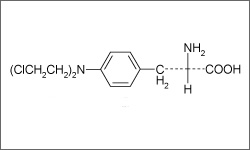Melphalan

Brand name:
Alkeran®
Brand name:
L-Phenylalanine mustard
Brand name:
L-Sarcolysin
IUPAC:
2-amino-3-[4-[bis(2-chloroethyl)amino]phenyl]propanoic acid
FDA approval:
Yes
Usage:
Malignancies in which melphalan is used include multiple myeloma, ovarian cancer, and breast cancer. Melphalan is usually administered intravenously or in pill form.1
- 1 Chu, E., & DeVita, V. T. (2015). Physicians' cancer chemotherapy drug manual 2015. Burlington, MA: Jones & Bartlett Learning.
Mechanism:
Melphalan (Alkeran®, L-Sarcolysin, Phenylalanine mustard) is an alkylating agent, that works through forming cross-links with DNA, which results in inhibition of DNA synthesis.1
The molecular structure above is the 3D conformer of Melphalan.
- 1 Chu, E., & DeVita, V. T. (2015). Physicians' cancer chemotherapy drug manual 2015. Burlington, MA: Jones & Bartlett Learning.
Side effects:
Common side effects include myelosupression (decreased blood cell counts), excessive bleeding, nausea and vomiting. Melphalan may also cause birth defects. Women who are pregnant or are thinking of becoming pregnant should not take this drug.1
- 1 Chu, E., & DeVita, V. T. (2015). Physicians' cancer chemotherapy drug manual 2015. Burlington, MA: Jones & Bartlett Learning.
